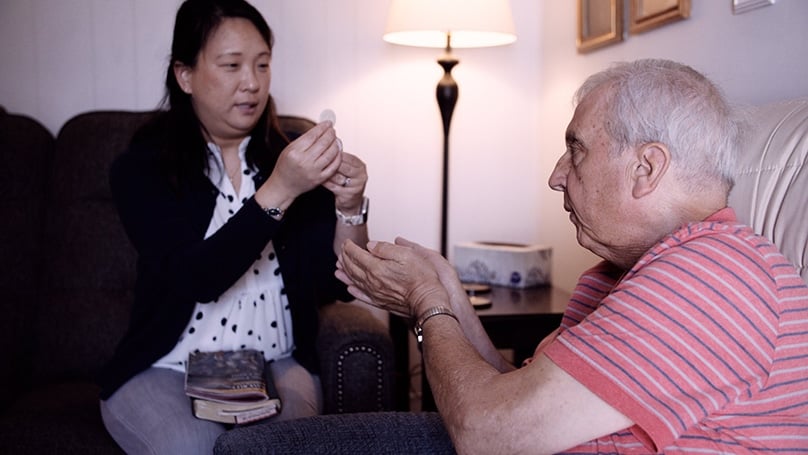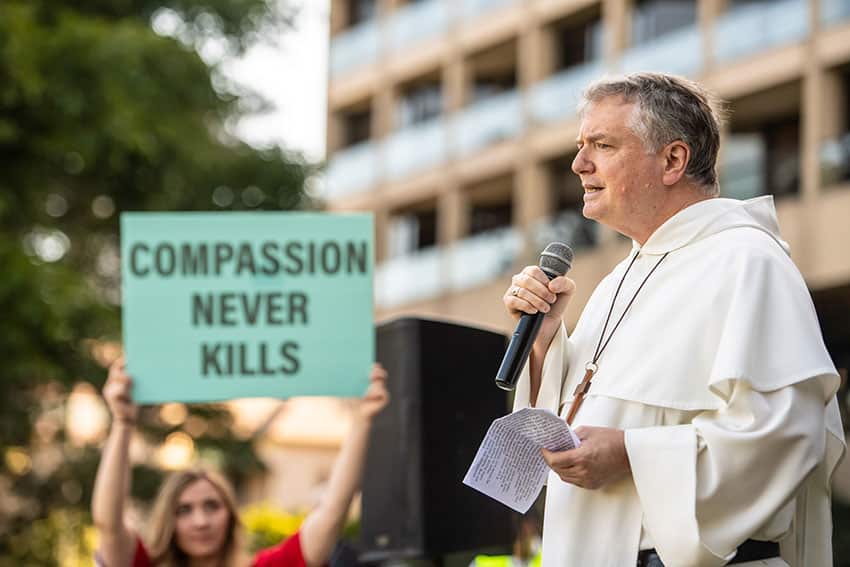
Catholics who seek to end their lives by euthanasia should not receive the anointing of the sick and the Eucharist, the Australian Catholic Bishops Conference has said in a pastoral document published as Voluntary Assisted Dying came into effect in NSW.
To Witness and to Accompany with Christian Hope, published on 27 November, presumes that a person seeking euthanasia is acting “in good faith” but gives priests and pastoral workers guidelines to determine when the sacraments should be withheld.
“The priest will firstly welcome the patient’s desire for the sacrament of God’s mercy and allow the patient to explain their situation and identify the areas of sinfulness in their life for which they seek God’s forgiveness,” the document explains.
“[T]he priest will explain why euthanasia is not consistent with respect for God’s gift of life and with ‘love of oneself’ as a person made in the image of God.
“Should the individual continue to believe they are choosing correctly and remain resolved upon this course, which is so clearly and gravely in conflict with the teaching and life of the church, then the patient should nonetheless recognise or be helped to recognise, that it would not be right for him or her to receive the sacraments.”
Voluntary Assisted Dying was legalised in late 2022, and came into effect on 28 November. The bishops and Catholic agencies have vocally opposed the scheme.
In an op-ed published in The Daily Telegraph and The Catholic Weekly, Archbishop Anthony Fisher OP said VAD was a “divisive law” that would create two classes of people, one which receives medical care, the other relegated to “prematurely ending their life.”
“I commit myself and the Catholic Archdiocese of Sydney to continue to press for fair laws and policies around the end-of-life, while doing our best to provide truly compassionate care to people of all faiths and none,” Archbishop Fisher wrote.
“I ask our lawmakers and community to give us the legal space to do so.”
In To Witness and to Accompany with Christian Hope, the bishops explain “our Christian duty” to separate the person from the action in delicate situations where an individual is called upon to provide care to Catholics who mistakenly consider euthanasia.
“[W]e should and do wish to support and accompany the people we love and care for, even when we cannot support the actions they are taking,” the document explains.

Yet support of a person, and not their actions, should not require someone to suspend their commitment to the Catholic teaching that VAD remains morally impermissible, the bishops continue.
“[T]he tension between supporting a person in contrast to supporting their actions is very familiar to family members,” the document explains.
Catholic family members should make clear they will not endorse or facilitate a relative’s request or consideration of euthanasia, though they will continue to love and support the person.
“[F]amily members should strive to remain faithful to each other despite the disagreements and tensions that arise,” the bishops said.
Pastoral care workers, such as chaplains and lay workers, also have a duty of care as they may be able to provide a more objective outlook than immediate family.
“This will enable them to explain to, and model for, family members the responsibility to accompany the patient without endorsing or facilitating the patient’s request for euthanasia.”
It also advises healthcare professionals who have personal and institutional duties in relation to euthanasia.
“Insofar as the topic of euthanasia arises within an individual medical or nursing practice, healthcare professionals should explain to patients and families why euthanasia is not part of ethical medical practice,” the document advises.
“Euthanasia is not ‘effective end-of-life’ care and the administration of a lethal substance does not address a patient’s medical needs.”
The bishops’ advice was prepared in consultation with a range of theologians, ethicists, liturgists and medical doctors, as well as with the Dicastery for the Doctrine of the Faith.
“It is vital that chaplains and pastoral workers have the information to confidently respond to the realities that are facing them as they minister to Catholics in hospitals, in aged care and in their own homes,” said the Archbishop of Melbourne, Peter Comensoli.
